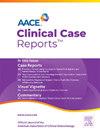Recurrent Pericarditis in a Woman With Acromegaly Responding Favorably to Transsphenoidal Surgery
IF 1.2
Q3 Medicine
引用次数: 0
Abstract
Objective
Acromegaly is associated with increased insulin-like growth factor 1 (IGF-1), promoting systemic inflammation and cardiovascular complications. We present a patient with acromegaly who developed recurrent pericarditis, resolving soon after somatotroph pituitary adenoma resection. The objective of this report is to describe a case of uncontrolled acromegaly with recurrent, unexplained pericarditis.
Case Report
A 46-year-old woman was referred after a neurologist identified a 9 mm pituitary lesion on magnetic resonance imaging. Laboratory tests showed elevated IGF-1 of 52.3 nmol/mL (12.3–32.9 nmol/L), a nonsuppressible growth hormone (GH) level of 3.8 mcg/L (<0.4 mcg/L) after a 75 g oral glucose tolerance test, confirming acromegaly. One-year postdiagnosis, the patient developed pleuritic chest pain from pericarditis with moderate-to-severe pericardial effusion. Symptoms resolved with nonsteroidal antiinflammatory drugs, colchicine and pericardiocentesis. Over 3 years she experienced multiple episodes of recurrent pericarditis. A comprehensive diagnostic workup, including rheumatologic and infectious evaluations, was negative. After transsphenoidal adenoma resection, IGF-1 normalized, and medical therapy was discontinued. Pericarditis recurred 2 months postoperatively but has not occurred again over 12 years of acromegaly remission.
Discussion
Hypersecretion of GH in acromegaly leads to elevated IGF-1 levels, which affect inflammatory responses. IGF-1 can promote systemic inflammation through proinflammatory cytokines, its effects may vary depending on tissue type. In this case, resolution of pericarditis following IGF-1 normalization suggests that elevated IGF-1 levels may mediate the inflammatory process in the pericardium.
Conclusion
The case suggests that acromegaly may predispose some patients to pericarditis, but its frequency and underlying pathogenesis remain unclear.
女性肢端肥大症复发性心包炎对经蝶窦手术反应良好
肢端肥大症与胰岛素样生长因子1 (IGF-1)升高有关,可促进全身炎症和心血管并发症。我们报告一位肢端肥大症患者,在切除垂体生长缺陷腺瘤后,出现复发性心包炎。本报告的目的是描述一个不受控制的肢端肥大症与复发,不明原因的心包炎的情况。病例报告一名46岁的女性在核磁共振成像上发现一个9毫米的垂体病变后被转诊。实验室检查显示IGF-1升高52.3 nmol/mL (12.3-32.9 nmol/L), 75 g口服葡萄糖耐量试验后非抑制性生长激素(GH)水平为3.8 mcg/L (0.4 mcg/L),证实肢端肥大症。诊断一年后,患者出现胸膜炎性胸痛,心包炎伴中重度心包积液。经非甾体类抗炎药、秋水仙碱和心包穿刺术治疗后症状消失。在3年多的时间里,她经历了多次复发性心包炎。综合诊断检查,包括风湿病学和感染性评估,结果为阴性。蝶窦腺瘤切除后,IGF-1恢复正常,停止药物治疗。心包炎术后2个月复发,但在肢端肥大症缓解后12年内未再发生。肢端肥大症患者生长激素分泌过多导致IGF-1水平升高,从而影响炎症反应。IGF-1可通过促炎因子促进全身性炎症,其作用可能因组织类型而异。在这种情况下,IGF-1正常化后心包炎的消退表明IGF-1水平升高可能介导了心包膜的炎症过程。结论本病例提示肢端肥大症可能使部分患者易患心包炎,但其发病频率和潜在发病机制尚不清楚。
本文章由计算机程序翻译,如有差异,请以英文原文为准。
求助全文
约1分钟内获得全文
求助全文
来源期刊

AACE Clinical Case Reports
Medicine-Endocrinology, Diabetes and Metabolism
CiteScore
2.30
自引率
0.00%
发文量
61
审稿时长
55 days
 求助内容:
求助内容: 应助结果提醒方式:
应助结果提醒方式:


